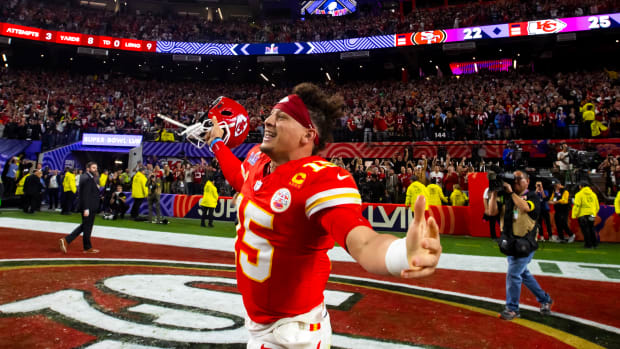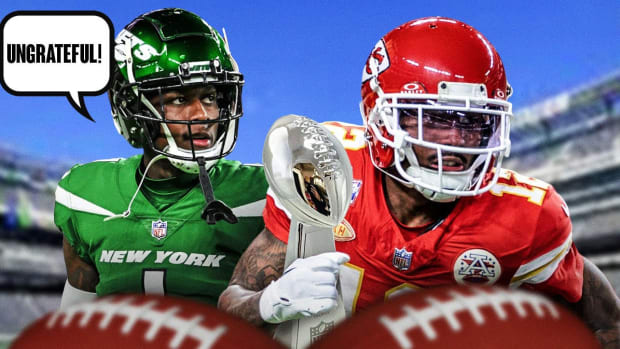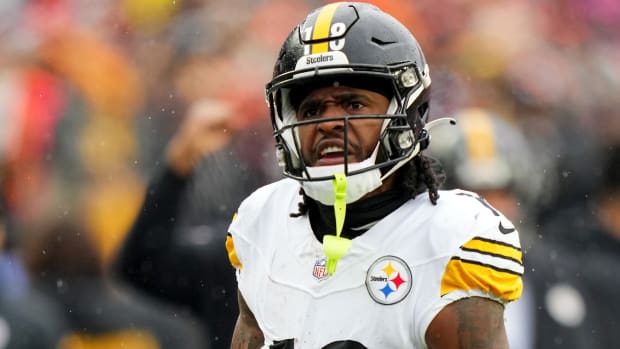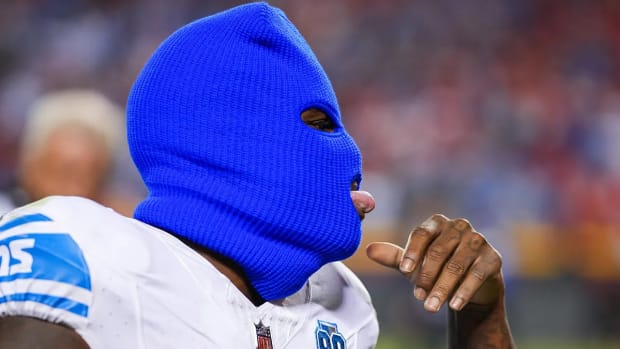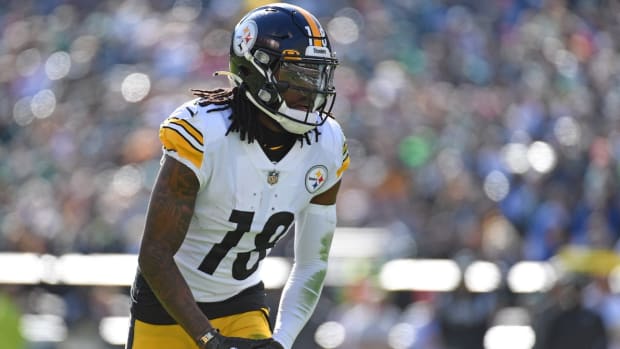Kaepernick Collusion Case: What Does It Mean that Jones, Kraft, Other Owners Will Be Deposed?
Free-agent quarterback Colin Kaepernick’s grievance for collusion rests on his ability to produce evidence that convinces system arbitrator Stephen Burbank that two or more teams, or at least one team and the NFL, deprived Kaepernick of a collectively bargained right—namely, the right to sign with a team. Each team individually reaching a decision to not sign Kaepernick would not constitute collusion. That is true even if teams in desperate need of a good quarterback individually decided not to sign the 30-year-old former San Francisco 49ers star and instead signed inexperienced quarterbacks of inferior talent. The same would be true if each team passed on Kaepernick for political, ideological or personal reasons rather than for football reasons.
While you might object to teams partaking in such behavior, you would not be objecting to collusion. Why not? Because in each scenario, each team would be acting individually; collusion requires multiple teams, or at least one team and the league.
Along those lines, Kaepernick must persuade Burbank that teams actually conspired with one another (or the league) to not sign him. To prove such a point, Kaepernick might produce emails, texts, phone records, written messages or witness statements in which owners or officials from different teams or the league collectively agreed to not sign him.
On Friday, ESPN’s Adam Schefter reported that Kaepernick’s grievance has moved to the stage of evidence gathering. According to Schefter, Dallas Cowboys owner Jerry Jones, Houston Texans owner Bob McNair and New England Patriots owner Robert Kraft are among persons who will be deposed as part of Kaepernick’s grievance process. They will also be required to turn over emails and cell phone records.
To be clear, a request to testify and turn over assorted records does not establish that Jones, McNair, Kraft or anyone else engaged in collusion. It simply means that Kaepernick’s representatives have requested information and targets of those requests have agreed to comply with the requests. NFL owners and team officials are obligated to cooperate in grievance matters. To that end, Burbank, a law professor at the University of Pennsylvania, has the right under the collective bargaining agreement to oversee reasonable discovery and to order depositions.
As a system arbitrator, Burbank is neutral—both the NFL and NFLPA select the person who occupies his position. He will take steps to ensure fairness and due diligence. This is not an Article 46 proceeding where NFL commissioner Roger Goodell, who by virtue of his position cannot be neutral, is the default arbitrator. This is a proceeding that connects to Article 17, which prohibits teams from colluding.
Professor Burbank, obviously, is not a judge. Further, Kaepernick’s grievance process is not a trial. It is instead an arbitration matter, and such matters involve more flexibility than trials.
Significance of Jones, McNair and Kraft—and President Donald Trump
Jones and McNair are interesting names given their vocal opposition to players who engage in protest during the playing of the national anthem. McNair also recently attracted controversy for warning against “inmates running the prison,” a phrase made in connection to league’s attempt at addressing the anthem protests. McNair later apologized for the remark, which he uttered during a private league meeting and which he insists has been misinterpreted.
The expressed viewpoints of Jones and McNair alone do not prove collusion. In order for Jones and McNair to have partaken in collusive conduct, they would need to have conspired with persons from other NFL teams or the league itself as part of an effort to ensure that Kaepernick remains out of the NFL. The same is true of Kraft, who has expressed more tolerant views of player protests.
Further, as noted above, the fact that multiple teams have signed free-agent quarterbacks who are arguably inferior to Kaepernick is not, by itself, proof of collusion. Teams are private businesses. They are not obligated to sign anyone.
One potential angle to follow is whether Jones’s relationship with Papa John's, which sponsors the NFL and as many as 23 NFL teams, advances Kaepernick’s argument. Earlier this week, Papa John's CEO John Schnatter blamed the NFL for failing to provide effective leadership on the national anthem issue. A source familiar with Kaepernick’s grievance tells The MMQB that Jones may have played a key role in crafting Schnatter’s sharp statement. If this proves accurate, Kaepernick will argue that Jones has played an instrumental role in encouraging teams to view the protests of Kaepernick and other NFL players in a negative light.
Kaepernick’s representatives have signaled that President Donald Trump is connected to the alleged collusion. In a statement last month, Kaepernick’s attorney, Mark Geragos, stressed that “athletes should not be denied employment based on partisan political provocation by the Executive Branch of our government.” Trump has spoken out against Kaepernick individually and more generally against NFL player protests. In fact, during a campaign rally in Alabama, Trump encouraged NFL owners to release players who protest (the legal consequences of which I discussed here and here).
Trump himself could not have engaged in NFL collusion. The CBA governs parties to the CBA, and Trump, who does not own an NFL team, is not a party to the CBA.
On the other hand, it’s at least theoretically plausible that the President might have spoken with owners, some of whom—including Jones, McNair and Kraft—financially supported his run for the White House and subsequent Presidential Inauguration. In doing so, it’s possible that Trump might have facilitated conversations between owners that led to discussions about Kaepernick.
A source familiar with Kaepernick’s grievance tells The MMQB it is noteworthy that a day after Kraft flew on Air Force One with Trump in March, Trump sharply criticized Kaepernick in a rally in Kentucky. Is there a connection between Kraft and Trump’s speech? It’s unknown, but Kaepernick hopes that Kraft will answer questions about his conversations with Trump while on Air Force One. It should be noted that in September, Kraft rebuked Trump over “the tone” of the President’s comments concerning player protests.
Whether any discussions between Trump and NFL owners would have advanced to plotting ways to keep Kaepernick off certain rosters or the NFL is unknown at this time. Depositions, in which the witnesses will be sworn to tell the truth under penalty of perjury, could prove revealing. The same is true of email records.
Such evidence might indicate that owners discussed Kaepernick and protests, and perhaps did so in detail. But if they only discussed Kaepernick in ways where they complain and bemoan—but not decide to take specific action against the quarterback—that would probably not be enough for a showing of collusion. Collusion requires evidence of a plot or a conspiracy.
The availability of evidence is also important. If Kaepernick requests electronic records—such as emails—that are no longer available, his attorneys will demand to know why they were deleted. If Burbank (the arbitrator) surmises that a team engaged in “spoliation of evidence” or intentional destruction of evidence, he would be more likely to infer guilt.
If Kaepernick can prove collusion, he could be awarded a considerable monetary award. Under Article 17 of the CBA, he would receive compensation for the amount of money he would have signed for if he had not been victimized by collusion. Plus, Kaepernick would receive two times the compensatory amount as non-compensatory (punitive) damages.
For example, if Kaepernick would have signed a $12 million contract but for collusion, he would be awarded $36 million in damages. Note that the highest paid NFL player in 2017, Detroit Lions quarterback Matthew Stafford, earns $27 million this year. Kaepernick could conceivably become the highest paid NFL player and not play a down in the NFL.
Will that happen? Only if that is where the evidence leads.
Michael McCann is SI’s legal analyst. He is also an attorney and the Associate Dean for Academic Affairs at the University of New Hampshire School of Law, and co-author with Ed O'Bannon of the forthcoming book Court Justice: The Inside Story of My Battle Against the NCAA and My Life in Basketball.
































